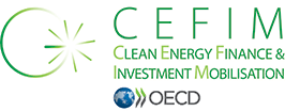Indonesia
Focus Group Discussion IV: Regulation and linkages to international carbon markets
 |
 |
 |
||
Background
The OECD Clean Energy Finance and Investment Mobilisation Programme (CEFIM), along with the International Energy Agency, have been assisting the Indonesian Government’s efforts to develop a domestic Emissions Trading Scheme (ETS) through a series of technical Focus Group Discussions (FGDs). Building on international experience and OECD/IEA work, these FGDs have made deep-dives into a variety of critical aspects of the development of effective ETS schemes, relevant to the Indonesian context. These events took place between November 2021 - May 2022.
Overview
As a key driver of energy-related emissions, decarbonising Indonesia’s power system will be determinant to achieve the country’s climate objectives. Indeed, under its recently updated nationally determined contribution (NDC), Indonesia aims to reduce its greenhouse gas (GHG) emissions by 29% (or 41% with international support) by 2030. In its recently submitted Long-Term Low-Emission Development Strategy, Indonesia has stated it will explore moving towards net-zero emissions 2060. As the country’s second largest greenhouse gas emitter, the energy (and power) sector is to make a major contribution towards these emission reduction targets.
Given the size of the challenge, Indonesia has been taking key steps to promote a clean energy transition. Most notably, Indonesia implemented a coal moratorium for new plants starting in 2022 and is planning for a massive increase of low-carbon power generation until 2060. In total, this transition away from coal could require around USD 1.165 trillion.
To support these measures, Indonesia is now looking to set a carbon price for the power and industry sectors in the form a domestic ETS, with a view to helping stimulate and drive investment towards low-carbon energy sources. As an initial step, Indonesia ran a voluntary emissions trading trial in the power sector from March to August 2021. The results of the pilot will be used to inform the mandatory ETS.
In light of these issues, this fourth and final FGD discussed regulation and the role of the financial sector in Indonesia’s emissions trading scheme, as well as linkages to international carbon markets. This included an overview of the Paris Agreement Rulebook as outlined under Article 6. During the discussion, country experts shared their experience on linking with other carbon markets, including institutional arrangements, monitoring and verification systems, and certification of carbon offsets. An open dialogue, convening representatives from government institutions, development partners and other relevant stakeholders, was organised towards the end of the event to inform and identify priority areas for future consideration in Indonesia’s ETS development.
- Watch the video recording of the event
Speakers
Opening remarks
- Ir. M Priharto Dwinugroho MSE, Director of Electricity Engineering and Environment, MEMR
- Sara Moarif, Head of the Environment and Climate Change unit, IEA
Panel Discussion I
Moderator: Hakimul Batih, Indonesia CEFIM Programme Local Co-Ordinator, OECD
- Edi Broto Suwarno, Director of Capital Market Regulations, Financial Services Authority (OJK): “Role of the financial sector in Indonesia's ETS”
- Pak Ilham, Climate Change Policy Expert, Deputy of Environment Management and Forestry Affairs, Coordinating Ministry for Maritime and Invesment: “Opportunity of linking international and national carbon market in Indonesia and plans to expand Indonesia's ETS to other sectors”
- Sindisiwe Mashele, Department of Forestry, Fisheries and Environment, South Africa: “Establishment of a national system for GHG measurement, reporting and verification (MRV)”
Panel discussion II
Moderator: Kieran McNamara, Senior analyst, IEA
- Luca Lo Re, IEA: “Overview of Article 6 and the Paris Agreement Rulebook”
- Noriko Tamiya-Hase, Deputy Director, Office of Market Mechanisms and Office of International Strategy on Climate Change, Ministry of Environment, Japan: “Recent development of the Joint Crediting Mechanism (JCM)”
- Ted Jamieson, ETS Markets Team, New Zealand Ministry for the Environment: “Evolution of NZ ETS: connecting and disconnecting”
- Seoyoung Lim, Deputy General Manager, Department of Carbon Neutrality, Korea: “Decarbonisation strategies and Article 6 implementation plan of the Republic of Korea”
Open discussion
Moderator: Hakimul Batih, Indonesia CEFIM Programme Local Co-Ordinator, OECD
- MoEFF
- PLN
- Coal and RE IPPs
- DG of Electricity, MEMR
- BAPPENAS
Closing remarks
- Cecilia Tam, CEFIM Programme Team Leader, OECD
- Ir. M Priharto Dwinugroho MSE, Director of o, ST, MBA, Environmental Protection Co-ordinator, Directorate General of Electricity, MEMR
Contact
For more information, please contact:
- Geraldine Ang, Team Leader, Clean Energy Finance and Investment Mobilisation, geraldine.ang@oecd.org
- Hakimul Batih, Indonesia Programme Local Co-ordinator, hakimul.batih@oecd.org

